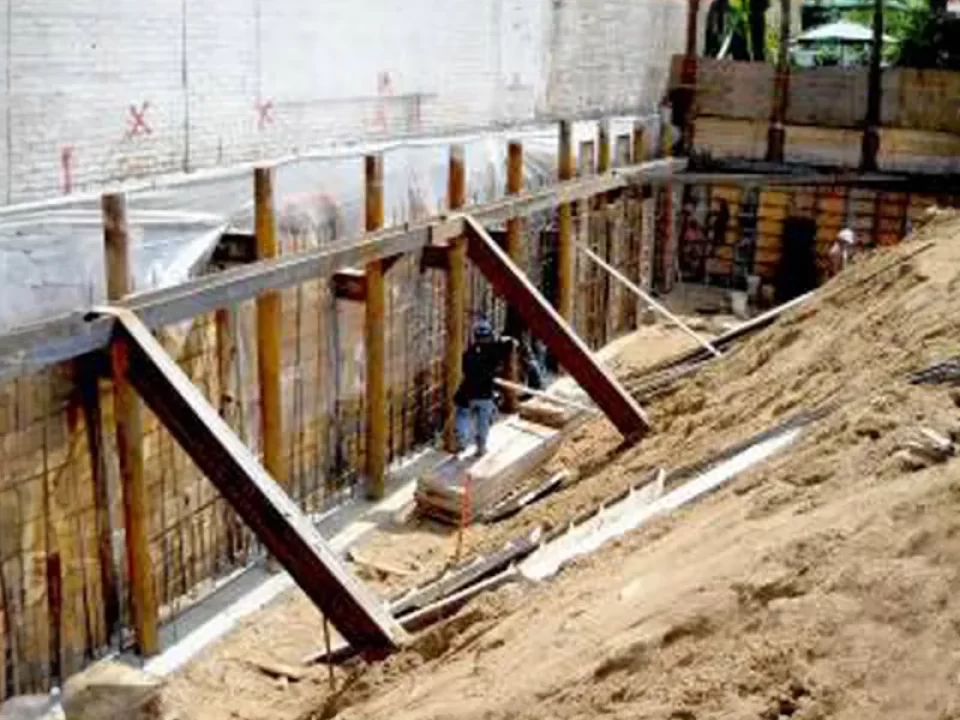Support Of Excavation

SOE Construction Services in New York
At Marine Bulkheading specializes in Support of Excavation (SOE) services, which are crucial for ensuring the safety and stability of trenches and foundations in construction projects across New York. With years of experience and a profound understanding of soil mechanics, our team excels in designing and implementing temporary structures such as sheet piles, soldier piles, shoring, and retaining walls. We prioritize worker safety and adhere strictly to local building codes, ensuring reliable and efficient project execution in even the most challenging soil conditions.
Our SOE Services
From sheet piles to soldier piles, shoring, and retaining walls, our tailored solutions ensure the integrity of your project’s foundation while mitigating risks associated with excavation work.
Steel sheeting involves the installation of interlocking steel panels or sheets to provide temporary or permanent support for earth retention, excavation, or construction projects. These sheets are typically driven into the ground using vibratory or impact hammers, creating a continuous barrier to prevent soil movement and stabilize excavations. Steel sheeting is commonly used in applications such as retaining walls, cofferdams, and waterfront structures.
Soldier pile and lagging walls are earth retention systems consisting of vertical steel piles (soldier piles) spaced at regular intervals and horizontal timber, concrete, or steel lagging installed between the piles. This system provides temporary or permanent support for excavations, slopes, or retaining walls, with the lagging serving as a facing to hold back soil or rock. Soldier pile and lagging walls are versatile and cost-effective solutions for stabilizing earthworks in various soil conditions.
Soil mix walls, also known as soil-cement walls or soil-cement-bentonite walls, are constructed by mixing native soil with cement or other additives to create a stable, impermeable barrier. This mixture is typically injected or mixed in-situ using specialized equipment, forming a continuous wall or barrier to retain soil, control groundwater, or stabilize excavations. Soil mix walls are commonly used in environmental remediation, foundation construction, and underground construction projects.
Secant and tangent pile walls are types of deep foundation systems used for earth retention and excavation support. Secant piles are installed with overlapping concrete or steel shafts to form a continuous wall, while tangent piles are installed with non-overlapping shafts. These systems are commonly used in urban environments, where space constraints or adjacent structures limit excavation depth, and provide efficient and cost-effective solutions for stabilizing soil and controlling groundwater.
Tiebacks are horizontal or inclined structural elements installed in soil or rock to provide lateral support and stability to retaining walls, excavations, or slopes. These elements typically consist of high-strength tendons, anchors, or rods installed through the face of the retaining structure and anchored into stable ground or rock formations. Tiebacks are essential components of earth retention systems, helping to counteract soil pressure and prevent structural failure.
Soil nails are slender, grouted or threaded rods installed into natural or excavated slopes to reinforce and stabilize unstable soil masses. These nails are typically drilled or driven into the ground at specified angles and lengths, with grout or other adhesive materials injected into the surrounding soil to bond the nail to the ground. Soil nails are commonly used in slope stabilization, landslide mitigation, and retaining wall construction projects.
Slope stabilization involves the implementation of measures to prevent or mitigate soil erosion, landslides, or slope failures in natural or man-made slopes. This may include the installation of retaining structures, erosion control measures, vegetation reinforcement, or drainage systems to enhance slope stability and reduce the risk of slope instability. Slope stabilization techniques are essential for protecting infrastructure, property, and the environment from the adverse effects of slope instability.
Underpinning is a construction technique used to strengthen and stabilize the foundation of an existing structure or to increase its depth. This may involve excavating beneath existing footings and installing new foundations, piles, or support systems to transfer loads to deeper, more stable soil layers. Underpinning is commonly used to address foundation settlement, structural damage, or changes in soil conditions that compromise the stability and integrity of buildings and structures.
Learn How MBI can Help Your Project Succeed
- (516) 785-7557
- (516) 785-2280
- estimating@mbipiles.com
-
3512 Bay Ct
Seaford, NY 11783 -
4060 N Federal Hwy
Lighthouse Point, FL 33064
Other Services
Explore our specialized construction services, providing precision in excavations, marine constructions, and drilling solutions. Trust us to deliver excellence and reliability every step of the way
Marine Construction
- Learn More
Concrete Foundations
- Learn More
Deep Foundations & Piles
- Learn More
Excavation & Site Work
- Learn More
Support Of Excavation
- Learn More
Queens NY
- Learn More
Long Island NY
- Learn More
Bronx NY
- Learn More
